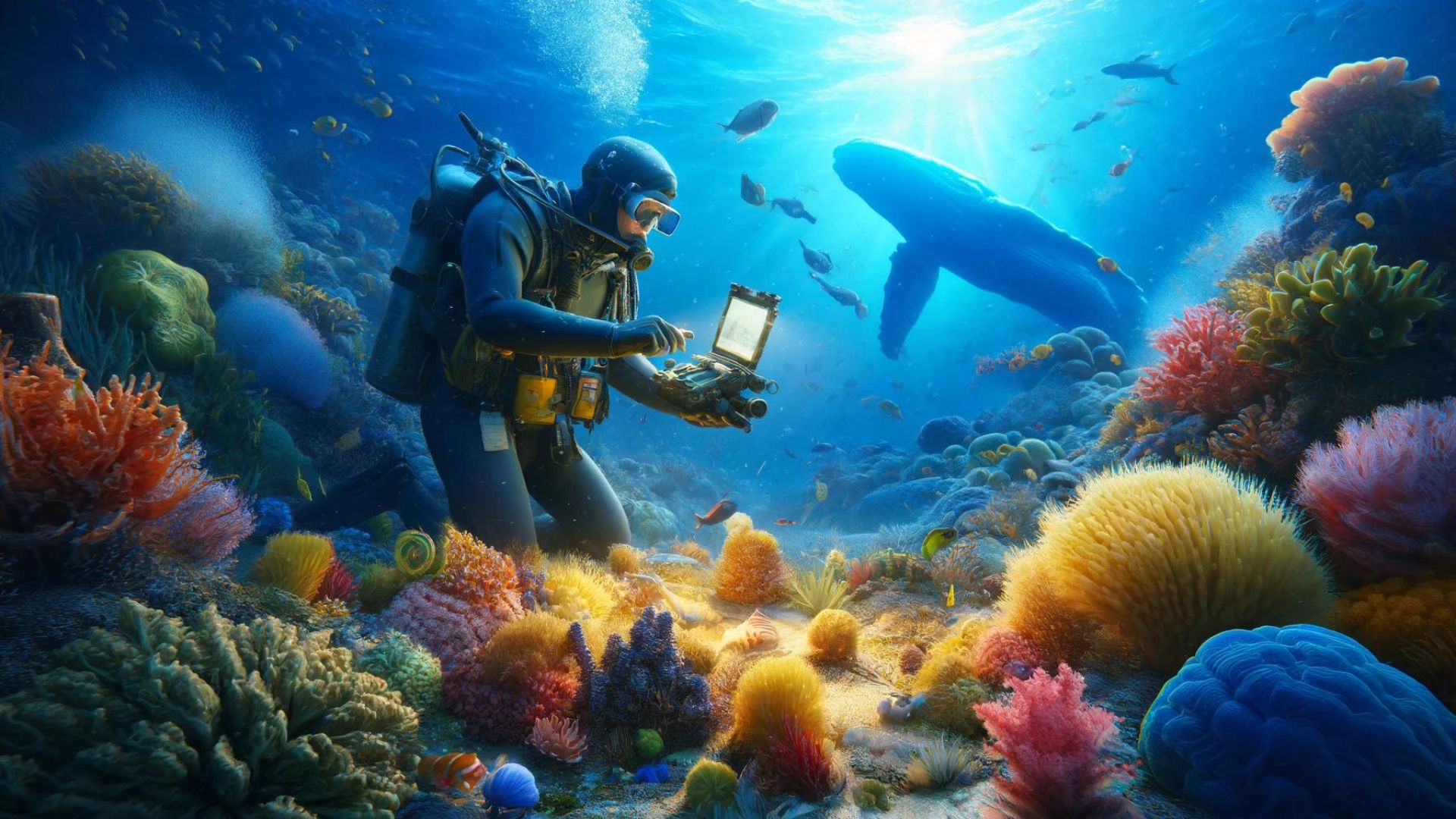- Beneath the Surface: Unveiling the Life of a Marine Biologist
- A Day in the Life: More Than Just Swimming with Dolphins
- The Skills of a Sea Explorer
- Charting Your Course
- Your Dive into the Deep
- Your Call to Action:
- Why Should You Care?
- Key Takeaways
- Keywords & Definitions
- Frequently Asked Questions
- Myth Buster
- Let’s Talk
Beneath the Surface: Unveiling the Life of a Marine Biologist
Imagine a life where your office is the vast, mysterious ocean. Your co-workers are dolphins, sharks, and coral reefs. Your job? To explore the secrets of the underwater world, unraveling its complexities and advocating for its protection. This is the extraordinary reality of marine biologists.
Marine biology isn’t just a career; it’s a calling. It’s a passion for the ocean and its inhabitants that drives these scientists to dedicate their lives to understanding and conserving marine ecosystems.
A Day in the Life: More Than Just Swimming with Dolphins
If you picture marine biologists frolicking with dolphins all day, think again. While fieldwork is a thrilling part of the job, it’s just one piece of the puzzle.
A typical day might involve:
- Research: Marine biologists design and conduct research studies to investigate marine organisms, their behavior, and their interactions with the environment. They might collect data on coral reefs, track the migration patterns of whales, or study the effects of pollution on marine life.
- Data Analysis: Crunching numbers, analyzing data, and writing scientific papers are all part of the job. Marine biologists use their findings to inform conservation efforts, educate the public, and influence policy decisions.
- Lab Work: Many marine biologists spend time in laboratories, conducting experiments, analyzing samples, and identifying new species.
- Teaching and Outreach: Some marine biologists work in academic settings, teaching courses and mentoring students. Others work for non-profit organizations or government agencies, educating the public about ocean conservation and advocating for policies that protect marine life.
The Skills of a Sea Explorer
Becoming a successful marine biologist requires a diverse skill set:
- Scientific Expertise: A strong foundation in biology, chemistry, physics, and mathematics is essential.
- Diving Skills: Many marine biologists need to be certified divers to conduct underwater research.
- Data Analysis: Proficiency in statistical analysis and data visualization is crucial for interpreting research findings.
- Communication Skills: Marine biologists need to be able to communicate their findings clearly and effectively to a variety of audiences, from fellow scientists to policymakers to the general public.
- Passion and Perseverance: A deep love for the ocean and its creatures, coupled with the determination to overcome challenges, is essential for a fulfilling career in marine biology.
Charting Your Course
So, how do you embark on this exciting career path? Here’s a roadmap:
- Education: A bachelor’s degree in marine biology or a related field is typically the starting point. Many marine biologists go on to earn master’s or doctoral degrees to specialize in a particular area of research.
- Experience: Gaining hands-on experience through internships, volunteer work, or research assistant positions is crucial for building your skills and knowledge.
- Networking: Connect with other marine biologists, attend conferences, and join professional organizations to build your network and learn about job opportunities.
- Specialization: Consider focusing on a particular area of interest, such as coral reef ecology, marine mammalogy, or fisheries science.
Your Dive into the Deep
Remember, becoming a marine biologist is not just about studying the ocean; it’s about protecting it. Your work can make a real difference in conserving marine ecosystems and ensuring the health of our planet.
Your Call to Action:
If you’re passionate about the ocean, don’t let your dreams stay on the shore. Take the plunge and explore the vast opportunities in marine biology. Start by researching different programs, connecting with professionals in the field, and gaining hands-on experience.
The ocean is calling, and your adventure awaits!
Why Should You Care?
Cycling is more than just a hobby or mode of transport. Understanding its benefits can lead to:
- Improved Health: Cycling is a fantastic way to boost your physical and mental well-being. Regular cycling can reduce the risk of chronic diseases, improve cardiovascular health, aid in weight management, and enhance mood and mental clarity.
- Sustainable Lifestyle: Biking is an eco-friendly transportation option, helping to reduce carbon emissions and promote a healthier environment.
- Financial Savings: Replacing car trips with bike rides can save you money on gas, parking, and vehicle maintenance.
- Community Building: Cycling can connect you with like-minded people through group rides, clubs, or community events.
- Personal Enjoyment: It’s a fun and adventurous way to explore your surroundings and get some fresh air and exercise.
Key Takeaways
- Full-Body Workout: Cycling engages multiple muscle groups and provides a cardiovascular workout, making it an efficient and effective form of exercise.
- Low-Impact Exercise: It’s gentle on your joints, making it suitable for people of all ages and fitness levels.
- Mental Health Boost: Cycling can reduce stress, anxiety, and depression, promoting a positive mood and overall mental well-being.
- Accessibility: It’s a relatively accessible form of exercise that doesn’t require expensive equipment or gym memberships.
- Environmental Benefits: Cycling is a sustainable mode of transportation that reduces pollution and traffic congestion.
Keywords & Definitions
- Cycling: The act of riding a bicycle for transportation, recreation, or exercise.
- Fitness: The condition of being physically fit and healthy.
- Health Benefits: The positive effects that cycling has on physical and mental health, such as improved cardiovascular health, weight management, and reduced stress.
- Cardiovascular System: The heart, blood vessels, and blood, responsible for circulating oxygen and nutrients throughout the body.
- Low-Impact Exercise: Exercise that puts minimal stress on your joints, making it a good option for people with injuries or joint problems.
- Weight Management: The process of achieving and maintaining a healthy weight through diet and exercise.
- Mental Well-being: A state of emotional and psychological balance, characterized by positive emotions, resilience, and a sense of purpose.
- Bike Types: Different types of bicycles designed for specific purposes, such as road bikes, mountain bikes, hybrid bikes, and electric bikes.
- Cycling Gear: Equipment and accessories used for cycling, such as helmets, gloves, lights, and reflective clothing.
- Cycling Safety: Practices and precautions taken to ensure safe cycling, including wearing a helmet, following traffic rules, and being visible to others.
Frequently Asked Questions
- What if I haven’t biked in a long time or am a beginner? Start with short rides on flat terrain and gradually increase the distance and intensity as you build stamina. Consider taking a beginner cycling class or finding a cycling buddy for support and motivation.
- What kind of bike should I get? The best bike for you depends on your riding style, budget, and preferences. Research different types of bikes and consider visiting a local bike shop for expert advice.
- How can I stay motivated to bike regularly? Set realistic goals, find a cycling buddy or group, track your progress with a fitness app, and explore new routes to keep things interesting. Remember, the most important thing is to have fun!
Myth Buster
- Myth: Cycling is only for young, athletic people.
- Reality: Cycling is a great exercise for people of all ages and fitness levels. There are bikes and routes suitable for everyone, and you can adjust the intensity to match your abilities.
Let’s Talk
- What are your favorite things about cycling?
- What tips do you have for beginner cyclists?
- What are some creative ways to incorporate cycling into your daily routine?
Share your thoughts and join the conversation in the comments section below. Let’s inspire each other to get out there and enjoy the ride!












0 Comments